 Petzlover
PetzloverManx is originated from United Kingdom but Viverral is originated from United States. Both Manx and Viverral are having almost same weight. Both Manx and Viverral has same life span. Both Manx and Viverral has same litter size. Both Manx and Viverral requires Low Maintenance.
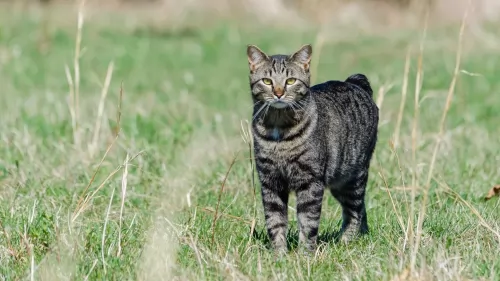 The Manx cat is a domestic cat originating on the Isle of Man, with a short tail. It is one of the oldest cat breeds.
The Manx cat is a domestic cat originating on the Isle of Man, with a short tail. It is one of the oldest cat breeds.
The cat is actually known as being a tailless cat. This is the cat's most distinguishing feature. They've been seen at cat shows since the 1800s.
These cats are descended from mainland stock, whose origins are unknown. It is said these cats are descended from the African wildcat.
The Manx is recognized by the Cat Fanciers Association as well as other cat associations.
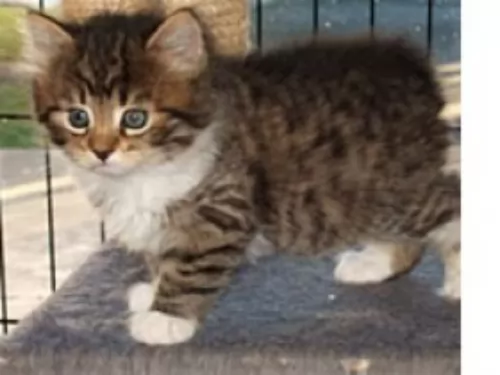 The Manx cat is a medium-sized cat with a stocky, muscular, heavy build. He can weigh between 3 and 6kg. Manx cats come in all coat colors and patterns.
The Manx cat is a medium-sized cat with a stocky, muscular, heavy build. He can weigh between 3 and 6kg. Manx cats come in all coat colors and patterns.
The coat of the cat can be short or long. The long-haired variety is considered its own breed. The cat has always been popular for helping farmers keep rodents under control.
Besides taillessness, the Manx is described as a round cat and its head is round too. The back legs of the cat are much longer than the forelegs.
The eyes of this cat are large and round and can be in different colors such as green, gold, copper, brown, or yellow.
They are very playful and intelligent cats who are devoted to their families. They can easily learn tricks and he can even be taught to walk on a leash.
They’re cats that love to jump and they’re active, playful cats. Don’t be surprised if you see him playing with the water in his water bowl as he is a cat fond of playing in water.
These cats are thought to be dog-like as they’re capable of becoming devoted to their human family. They also have a great sense of humor and they become very entertaining. Children love them as they’re so playful and they in turn get on well with children. When you have a Manx cat in your house, there is never a dull moment.
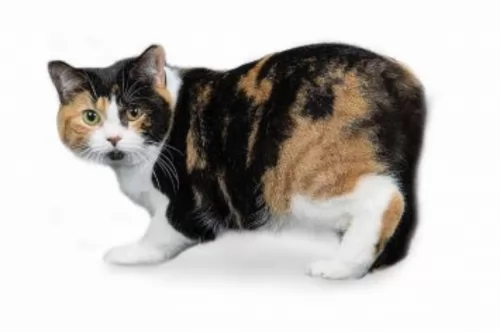 The loving Manx cat is such an even-tempered cat as well and wants to get along well with its entire human family. You can be sure of many years of affection and companionship from this cat.
The loving Manx cat is such an even-tempered cat as well and wants to get along well with its entire human family. You can be sure of many years of affection and companionship from this cat.
It’s a cat that is fairly placid but it still loves to run and play, It’s an amusing cat too and to round everything off it also has a strange way of walking and running.
Give the Manx cat a warm. Loving home and you’ll quickly discover why the Manx cat is such a popular companion cat for so many people. The Manx is such a social, family orientated cat and you shouldn't bring him into your home if you don't have plenty of time for him.
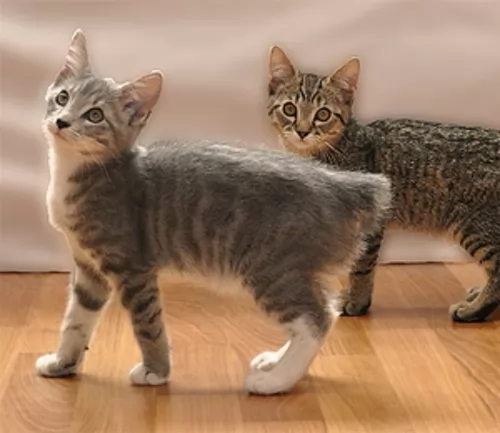 The absence of a tail with the Manx cat is believed to be a genetic defect and because of the spine that looks deformed, it is thought that this would cause the cat problems.
The absence of a tail with the Manx cat is believed to be a genetic defect and because of the spine that looks deformed, it is thought that this would cause the cat problems.
Arthritis can set in early with the Manx cat. Arthritis or osteoarthritis affects many cats and the signs of arthritis in a cat can actually be subtle. The disease can go undetected. Arthritis is about wear and tear in the joints, although other factors such as injury, infection and genetic makeup come into play as well. Arthritis can affect one or more joints in the body such as the hips, elbows ad spine.
The mutant gene that causes the taillessness in this cat may also be responsible for other skeletal deformities in the Manx cat. As a round-shaped cat, the Manx cat can also battle with bladder control.
These ailments are just possibilities with this cat breed and it is more than likely that your Manx cat will never have any one of these diseases.
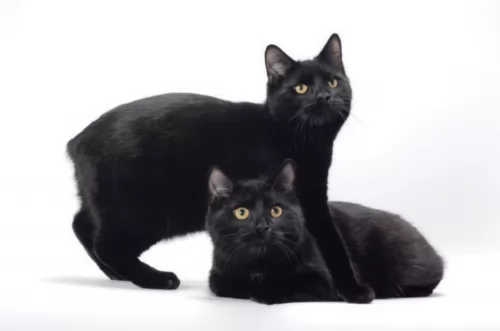 One of the most important caring things that you can do for your cat is to provide him with the best diet there is. The Manx cat requires a balanced diet of protein, vitamins and minerals.
One of the most important caring things that you can do for your cat is to provide him with the best diet there is. The Manx cat requires a balanced diet of protein, vitamins and minerals.
The Manx cat is a carnivore and will need a diet high in protein. Learn to read the labels on the packaging of the commercial cat food, whether wet or dry, and ensure that ingredients such as omega 3 fatty acids and taurine are in the ingredients list.
If you are in any doubt as to what to feed your Manx cat, speak to your vet.
The short coat of the Manx is easily cared for by a brush each week to remove dead, loose hair.
With this tailless cat, you need to check the rear end and perhaps clip the hair short in this area to ensure no feces clinging to the fur surrounding the anus.